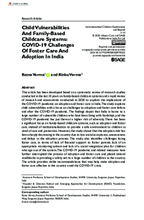Abstract
This article has been developed based on a systematic review of research studies conducted in the last 10 years on family-based childcare systems and a rapid review of research and assessments conducted in 2020 to explore the implications of the COVID-19 pandemic on adoption and foster care in India. The study explains child vulnerabilities with a focus on challenges to adoption and foster care before and after the COVID-19 pandemic. The findings depict that India is home to a large number of vulnerable children who have been living with hardships, and the COVID-19 pandemic has put them at a higher risk of adversity. There has been a significant focus on family-based childcare systems, such as adoption and foster care, instead of institutionalisation to provide a safe environment to children in need of care and protection. However, the study shows that the adoption rate has been sharply decreasing in the country due to low social acceptance, unawareness and delays in the adoption process. The study also identifies challenges facing foster care, in terms of lack of financial support to foster parents, lack of an appropriate monitoring system and lack of a social integration plan for children who age out of the system. The COVID-19 pandemic and related measures have further interrupted the process of adoption and foster care and placed several roadblocks in providing a safety net to a large number of children in the country. The article provides viable recommendations that may help make adoption and foster care effective in the country amid the COVID-19 crisis.

